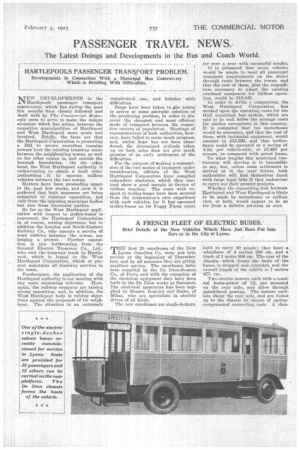PASSENGER TRAVEL NEWS. ,
Page 23

If you've noticed an error in this article please click here to report it so we can fix it.
The Latest Doings and Developments in the Bus and Coach World.
HARTLEPOOLS PASSENGER TRANVORT PROBLEM.
Developments in Connection With a Municipal Bus ControvIrsy Which is Bristling With Difficulties.
NTEW DEVELOPMENTS in the .1.111fartlepools passenger transport controversy, which has during the Past few months been closely followed and dealt with by The Commercial Motor, only seem to serve to make the unique situation which has arisen between the respective municipalities of Hartlepool and West Hartlepool more acute and involved. Briefly, the facts are that the Hartlepool Corporation is promoting a Bill to secure motorbus running powers Over the existing tramway route between the neighbouring towns, as well as for other routes in and outside the borough boundaries. On the other hand, the West Hartlepool authority is endeavouring to obtain a draft order authorizing it to operate railless vehicles between the two towns.
Matters have been proceeding apace in the past few weeks, and ..now it is gathered that both measures are being subjected to rigbrous opposition, not only 'from the opposing municipal bodies. but also from interested patties.
So far as the West Hartlepool application with respect to trolley-buses is concerned, the Hartlepool Corporation is, of course, raising oh tins, but in addition the London and North-Eastern Railway Co., who operate a setvice of , road vehicles between the towns, are lodging a protest. Farther opposi tion is also • forthcoming from the General Electric Tramway Co., Ltd., who own the tramway track hi Hartlepool, which is leased to the "West Hartlepool Corporation, which at present maintains all tramway services in the town.
Furthermore, the application of the Hartlepool authority is not meeting with any more reassuring welcome. Here, again, the railway company are raising strong opposition, and, in addition, the West Hartlepool body is raising objections against the proposals of its neighbour. The situation is an extremely complicated one, and bristles with difficulties.
Steps have been taken in jhe to-wns to arrive at some amicable solution of the perplexing problem, in order to discover the cheapest and most efficient mode of transport between the respective centres of population. Meetings of representatives of both authorities, however, have failed to make much progress, and, whilst hope has not been abandoned, the determined attitude taken up on • both sides does not give much promise of an early settlement of the difficulties.
For the purpose of making a combarisign of the two modes of transport under consideration, officials of the West Hartlepool Corporation have compiled exhaustive statistics, which they contend show 'a good margin in favour of railless traction.. The costs with respect to trolley-buses have been secured from the corporation's own experience with such vehicles, for it has operated trolley-buses on its Foggy Furze route for over a year with successful results.
It is estimated that seven vehicles would be ample to meet all passenger transport requirements on the direct through route between the towns, and that the cost of these, plus the expenditure necessary to adapt the existing overhead equipment for railless operation, would be 119,445.
In order to strike a comparison, the West Hartlepool Corporation has worked• upon the operating costs for the Hull municipal bus system, which are said to be well belbw the average costs for similar enterprises in this country. It is computed that ten motorbuses would be necessary, and that the cost of these, with incidental. equipment, would amount to /15,395, and that trolleybuses could be operated at a saving of 4.2d. per vehicte-mile, or 15,450 per annum, as compared with petrol buses.
To what lengths this municipal controversy will develop it is impossible tO say, but, unless some settlement is arrived at in the near future, both authorities will find themselves faced with large legal bills if they endeavour to carry out their present projects.
Whether the connecting link between Hartlepool and West Hartlepool is likely to be made by motorbuses or railless cars, or both, would appear to be as far from a definite solution as ever.




























